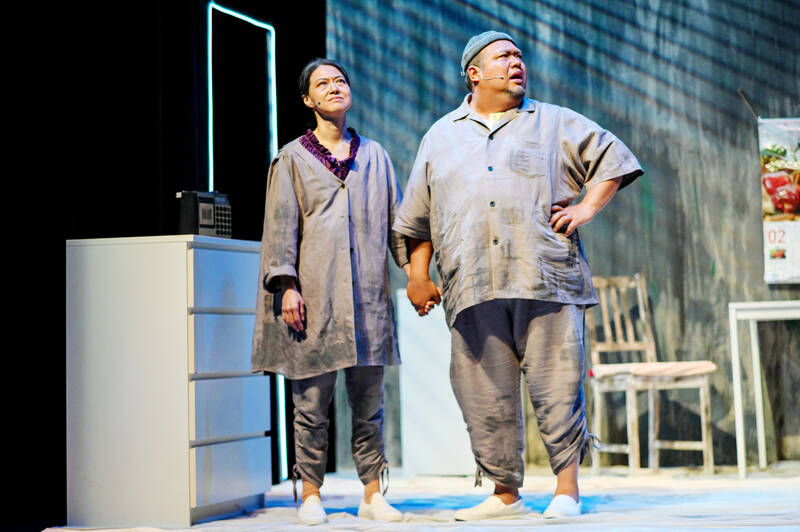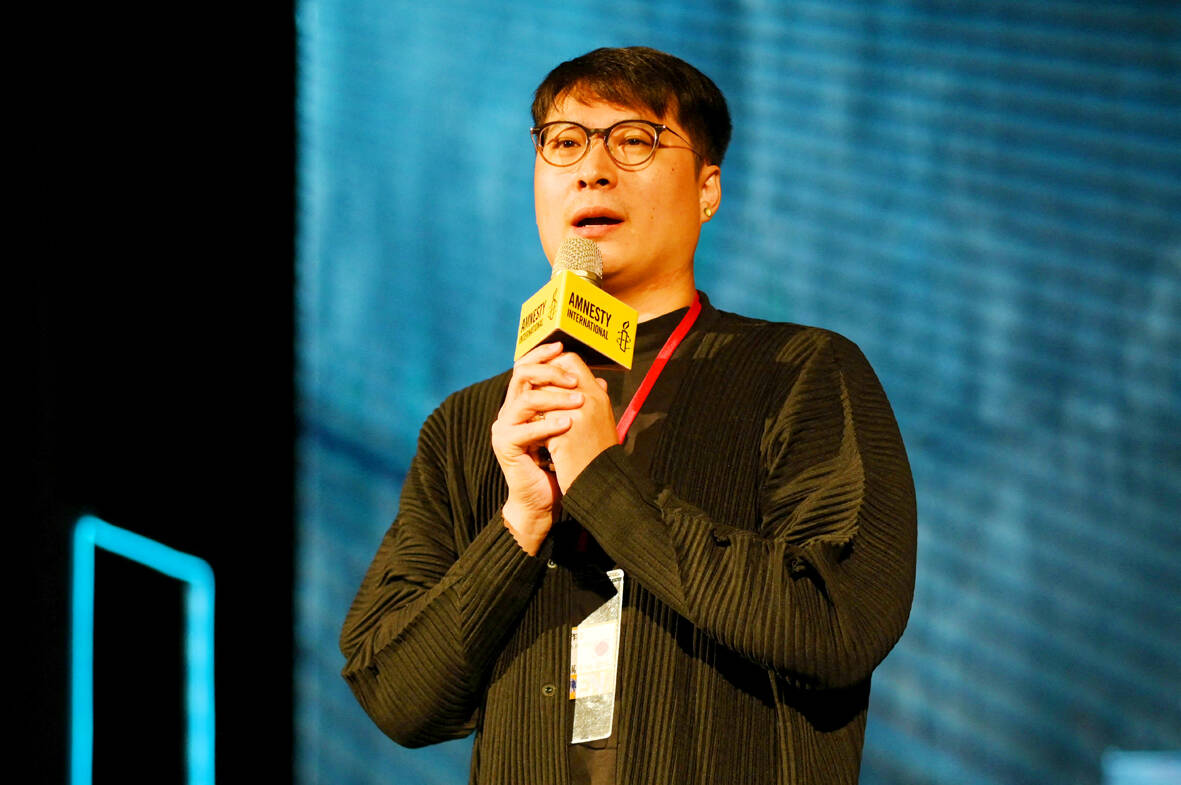Avant garde street performance, politically charged theater, pro-democracy music and poetry — powerful works of art dealing with China’s bloody Tiananmen Square crackdown that were once commonplace in Hong Kong have all but disappeared in recent years.
For decades, tens of thousands of people gathered annually in Hong Kong’s Victoria Park for a candlelight vigil marking June 4, 1989, when Chinese troops moved into Beijing’s Tiananmen Square to quell peaceful protests calling for reforms.
Hundreds, by some estimates more than 1,000, were killed in the crackdown.

Photo: AFP
Any mention of the day — let alone commemoration — has long been forbidden in mainland China, but the massive turnout every year in Victoria Park stood as an enduring symbol of the special freedoms Hong Kong enjoyed, even after its return to Chinese rule. But since Beijing imposed a national security law on the city in 2020 to quash dissent, authorities have suppressed public events mourning the Tiananmen crackdown, and artistic output commemorating the pivotal day has shriveled.
Hong Kong artist Luk Ming remembers how more than a dozen people took part in interpretive performances in the bustling district of Causeway Bay on the anniversary’s eve in 2009.
“The performers were not artists, but the everyman — there was a taxi driver, a teacher, and so on,” Luk said, using a pseudonym due to fear of repercussions.

Photo: AFP
As part of the “Our Generation’s June 4” art project, some performers had covered their bodies with yellow paint — a color associated with the city’s pro-democracy camp — as a representation of “freedom and hope,” Luk said.
“People were proactive then... with many trying to tell others about the crackdown lest we forget.”
Though a few hardcore artists might try to sustain the tradition, he added, “will they continue to put it out there under so much uncertainty?”
Just last year, on the day before the anniversary, artist Chan Mei-tung was bundled into a police van mid-performance for “misconduct in public places” and detained overnight.
The offending piece had seen her whittle a potato into the shape of a candle — once distributed by the thousands at the annual Tiananmen vigil — and hold a lighter to it.
‘SAFEGUARD A MEMORY’
In 2019, Hong Kong was rocked by massive, and at times violent, protests over an unpopular bill that morphed into a months-long movement calling for broader democratic change. The ensuing crackdown saw more than 10,000 people arrested, though more than 6,000 have yet to be formally charged.
Meanwhile, three organizers of the annual Tiananmen vigil have been charged with “incitement to subversion” under the national security law — an offense punishable by up to 10 years in prison. There has also been what amounts to an erasure of Hong Kong’s public memorials to Tiananmen: a museum run by the vigil’s organizers was shuttered, monuments were removed from universities and dozens of books about the 1989 crackdown were pulled from libraries.
For the fourth year running, June 4 is expected to be a neutered affair. Hong Kong Chief Executive John Lee (李家超) has issued vague warnings that “any act that is in breach of the law” will see police enforcement. Given the climate in Hong Kong, some artists have transplanted their works to more receptive soil.
For the past three years, Lenny Kwok, a Hong Kong musician who has organized commemorative concerts since 1990, has hosted an operetta marking the anniversary in Taiwan.
A mixture of music, poetry and storytelling, the show will open this year in a Taipei park with the reading of a poem by Nobel laureate Nelly Sachs, who fled Nazi rule during World War II.
“All the nations are ready to rise up from the map,” the poem begins.
Kwok said he believes the desire for freedom and democracy in both Hong Kong and Taiwan is closely connected to the Tiananmen incident.
“We are here to safeguard a memory that is being gradually erased, rewritten and re-interpreted,” he said.
‘CONNECT WITH ART’
Taiwan will also see a performance of 35th of May, a stage drama by Hong Kong playwright Candace Chong, on the anniversary weekend. The play — its name a coded reference to June 4, mentions of which are censored in China — follows an elderly couple’s decision to openly mourn their son who died in Tiananmen Square after decades of grieving silently. It debuted in Hong Kong in 2019, but the troupe that originally produced it, Stage 64, disbanded two years later.
Stage 64’s founder Lit Ming-wai translated the script from Cantonese — Hong Kong’s native tongue — into Mandarin and English for Taiwanese audiences. She said she still felt the “boundaryless power” of Hong Kong’s security law, even when publishing the script in Taiwan.
For example, the play’s original tagline — “Unveil the memories once displaced; confront the abnormal red line” — was changed due to legal concerns from the publishing house. It is now “On the 35th of May, let’s meet in the open.”
The six showings have been booked out by more than 1,000 people. Taiwanese director Chung Po-yuan (鍾伯淵) said he hoped the play would push the audience to reflect on the island’s authoritarian past, while thinking about their future in the face of China’s claim over the self-ruled democracy.
“If we lose our guard, it may recur in the future,” Chung said.

As I finally slid into the warm embrace of the hot, clifftop pool, it was a serene moment of reflection. The sound of the river reflected off the cave walls, the white of our camping lights reflected off the dark, shimmering surface of the water, and I reflected on how fortunate I was to be here. After all, the beautiful walk through narrow canyons that had brought us here had been inaccessible for five years — and will be again soon. The day had started at the Huisun Forest Area (惠蓀林場), at the end of Nantou County Route 80, north and east

Specialty sandwiches loaded with the contents of an entire charcuterie board, overflowing with sauces, creams and all manner of creative add-ons, is perhaps one of the biggest global food trends of this year. From London to New York, lines form down the block for mortadella, burrata, pistachio and more stuffed between slices of fresh sourdough, rye or focaccia. To try the trend in Taipei, Munchies Mafia is for sure the spot — could this be the best sandwich in town? Carlos from Spain and Sergio from Mexico opened this spot just seven months ago. The two met working in the

Exceptions to the rule are sometimes revealing. For a brief few years, there was an emerging ideological split between the Democratic Progressive Party (DPP) and Chinese Nationalist Party (KMT) that appeared to be pushing the DPP in a direction that would be considered more liberal, and the KMT more conservative. In the previous column, “The KMT-DPP’s bureaucrat-led developmental state” (Dec. 11, page 12), we examined how Taiwan’s democratic system developed, and how both the two main parties largely accepted a similar consensus on how Taiwan should be run domestically and did not split along the left-right lines more familiar in

This month the government ordered a one-year block of Xiaohongshu (小紅書) or Rednote, a Chinese social media platform with more than 3 million users in Taiwan. The government pointed to widespread fraud activity on the platform, along with cybersecurity failures. Officials said that they had reached out to the company and asked it to change. However, they received no response. The pro-China parties, the Chinese Nationalist Party (KMT) and Taiwan People’s Party (TPP), immediately swung into action, denouncing the ban as an attack on free speech. This “free speech” claim was then echoed by the People’s Republic of China (PRC),